2019年高一英语(人教新课标)必修三教案:Unit 3 The million pound bank note 宾语从句和表语从句用法归纳
人教版高一英语必修3Unit 3教学设计教案
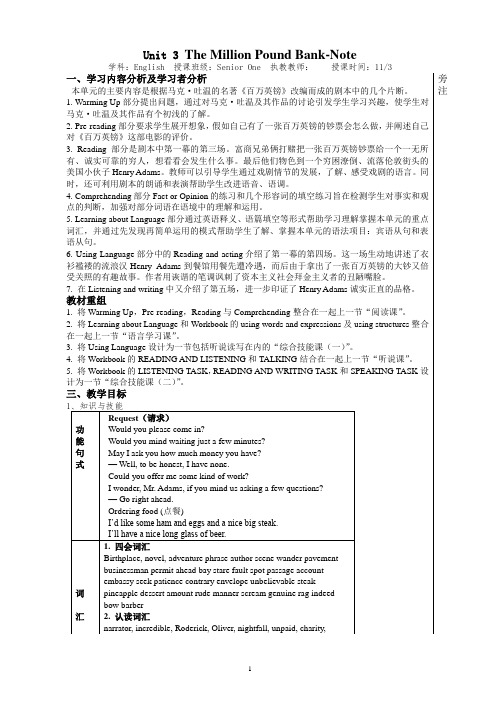
Unit 3 The Million Pound Bank-Note学科:English 授课班级:Senior One 执教教师:授课时间:11/3一、学习内容分析及学习者分析本单元的主要内容是根据马克·吐温的名著《百万英镑》改编而成的剧本中的几个片断。
1. Warming Up部分提出问题,通过对马克·吐温及其作品的讨论引发学生学习兴趣,使学生对马克·吐温及其作品有个初浅的了解。
2. Pre-reading部分要求学生展开想象,假如自己有了一张百万英镑的钞票会怎么做,并阐述自己对《百万英镑》这部电影的评价。
3. Reading部分是剧本中第一幕的第三场。
富商兄弟俩打赌把一张百万英镑钞票给一个一无所有、诚实可靠的穷人,想看看会发生什么事。
最后他们物色到一个穷困潦倒、流落伦敦街头的美国小伙子Henry Adams。
教师可以引导学生通过戏剧情节的发展,了解、感受戏剧的语言。
同时,还可利用剧本的朗诵和表演帮助学生改进语音、语调。
4. Comprehending部分Fact or Opinion的练习和几个形容词的填空练习旨在检测学生对事实和观点的判断,加强对部分词语在语境中的理解和运用。
5. Learning about Language部分通过英语释义、语篇填空等形式帮助学习理解掌握本单元的重点词汇,并通过先发现再简单运用的模式帮助学生了解、掌握本单元的语法项目:宾语从句和表语从句。
6. Using Language部分中的Reading and acting介绍了第一幕的第四场。
这一场生动地讲述了衣衫褴褛的流浪汉Henry Adams到餐馆用餐先遭冷遇,而后由于拿出了一张百万英镑的大钞又倍受关照的有趣故事。
作者用诙谐的笔调讽刺了资本主义社会拜金主义者的丑陋嘴脸。
7. 在Listening and writing中又介绍了第五场,进一步印证了Henry Adams诚实正直的品格。
人教版新课标高一第三模块教案Unit 3 The Million Pound Bank-Note

人教版新课标高一第三模块教案Unit 3 The Million Pound Bank-NoteTeaching aims:Talk abouand drama2. Learn how to act out a plaLearn how to request and order foodLearn noun clauses as the object and predicativeTd Intensive readingI.Warming uark Twabablw American writers with whom students are already familiar. This exaad out how muudw about this writer and decide how mud to know about the author bad the plaT: Do you knowg about the American writer Mark Twain?: A littlT: Today we will leag about this great wAmericaNow please read “About Mark Twain” on page 23 so that you can know more abouudents read the passage about Mark Twain and answer the qugivage 2a. What’al name of Mark Twain?b. When was he born and when did he die?Do you know all the places wlived?d. Can you naamou?T: As we know, Mark Twawn as a humorist during his life. Andlected in THE MILLION POUND BANK-NOTday we will leaaamous plaⅡPre-readingGuddiscuss the question wartners and thenawurage to exlT: If agives you a large amouuse as you lxamplllion pound, what will you do? Why?( Students have a discuquWhatevudents mauld be readlassmates a good rea)…T: I think all of you have a good idea. Do you waw what happened to Henry Adams in THE MILLION POUND BANK-NOTE written by Mark Twain? Have you ever read?lass we will leagⅢ While readinganningGudd the wholquickly and accurately and meanwhile hela good habading. Givudad througand then answqua. How did Henry Adagland?b. Where did Henry work before? How much did he have?What did the two gentlemen give Henry?d. When can Hl2. Audents discuss the quandanswers wwhole claT: Lape andd ouarawhole passag: Tart of a plaarrawT: OK. All of you have done a good job. Next, let’s readagain and dxⅣPost-readingDding exand explain :a. a large amount of: a large qua; a great dealg. They bought a large amount of furniture bvedw houb.make a bet: make an arrangan event of wult is doubtfulg. We made a bulab to dg: allow somebody to dggdoesn’daained.d. by accident: as a result of chag. I only foundit by accidare at: look at somebodg wwida fixed gaze( in awonder, fear, etc)b: to tell you the truth; to be frag. To bI don’we have a chance of winningⅤ HomewReviewa2. Preview the wordd periodAct out the play in groupsTd period: ActingI ActingT: Are you ready to act out the play now class?:T: Good. Let’s welgroup andd group please get prepared.…T: Class, we should pay axampl es of Mark Twain’s huwhich will help us better understand the play and act it out more appropriately. Do you agree with me?:uII HomewReview what we learnedunitThe Third period Watching the movie The Million Pound Banknote。
2019-2020学年人教版高中英语必修3教案Unit3TheMillionPoundBankNoteperiod2教案1

Unit 3 The Million Pound Bank NoteGrammar整体设计教材分析This is the third teaching period of this unit. To test whether students have grasped the important and difficult language points they learned in the last period, the teacher should first offer them some revision exercises. Then lead in the new lesson.This teaching period mainly deals with the new grammar items: 1. noun clauses as the object; 2. noun clauses as the predicative. Students often feel noun clauses abstract and difficult to learn, so it is necessary to make the lesson interesting and lively, and connect it with their daily life in order to let it easy to accept and understand. Firstly, the teacher can ask students to read the play The Million Pound Bank Note again, tick out all the sentences from the play where noun clauses are used as the object and the predicative, and then translate them into Chinese. Secondly, compare and discover the uses of each noun clause by giving a lot of example sentences. Thirdly, do the exercises in Discovering useful structures on Page 21 and more exercises for students to master the related noun clauses. Finally, summarize the use of noun clauses as the object and the predicative and let students make it clear how each noun clause is being used in the situations.At the end of the class, ask students to do the exercises in Using structures on Page 57 and additional exercises for consolidation.教学重点Get students to understand and use noun clauses as the object and the predicative.教学难点Enable students to learn how to use noun clauses as the object and the predicative correctly.三维目标知识目标1. Get students to know more about noun clauses.2. Let students learn noun clauses as the object.I can’t say that I have any plans.. . . and he does not know what he should do.I did not know whether I could survive until morning.3. Have students learn noun clauses the predicative.That’s why we’ve given you the letter.The fact is that I earned my passage by working as an unpaid hand. . .能力目标Enable students to use noun clauses as the object and the predicative correctly and properly according to the context.情感目标1. Get students to become interested in grammar learning.2. Develop students’ sense of group cooperation.教学过程设计方案→Step 1 Revision1. Check the homework exercises.2. Dictate some new words and expressions.→Step 2 Leading-in by a gamePlay the game of “Pass the message”. Show the same written message to the first person in each team of the class. Ask the person to pass the message on orally in indirect speech as quickly as possible. The first team that finishes it must put up their hands and the last person tells the class the message. If he/she has got it right, that team has won the game.Example 1:Message: There will be no homework tonight.S1: The teacher said that there would be no homework tonight.Example 2:Message: The fact is that she has been ill for 3 days.S1: The teacher said the fact was that she had been ill for 3 days.→Step 3 Grammar learning1. Reading and discoveringAsk students to turn back to Page 17 to read through the play The Million Pound Bank Note, let them pick out the sentences using noun clauses as the object and the predicative, read them aloud, and then translate them into Chinese.Suggested answers:Sentences using noun clauses as the object:1. Oliver believes that with a million pound bank note a man could survive a month in London.奥利弗相信一个拥有一张百万英镑钞票的人可以在伦敦生存一个月。
人教版高中英语必修三 Unit 3 Using language教案
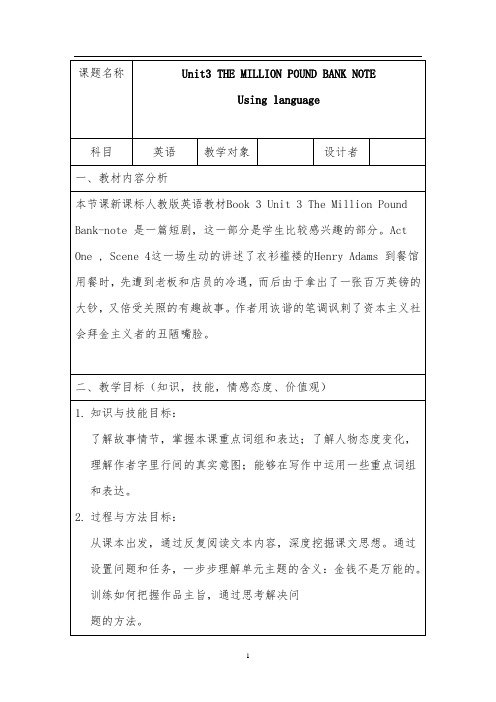
多媒体,黑板,视频,图片
六、教学过程
教学过程
教师活动
学生活动
设计目的
第一步:lead in
Show some pictures to the studentsandask two groups to play Act One, Scene3
Students come to the front of the classroom and play Act One, Scene3
According to the key words and retell the story
To output what the students havelearned in class.
七、教学评价
•Face all students, design different activities, try hard to arouse students’ interest.
Show the movie to the Ss and present two questions:(1)What did the hostess feel
When Henry came into the restaurant? How do you know?(2)Why were the owner and hostess shocked when she saw the million pound bank-note in Henry’s hand?
•Highline the students main body and respect individual difference.
•Attach as many opportunities as possible for the students to output after input.
高中英语人教新课标必修三Unit 3 The million Pound Bank Note教案
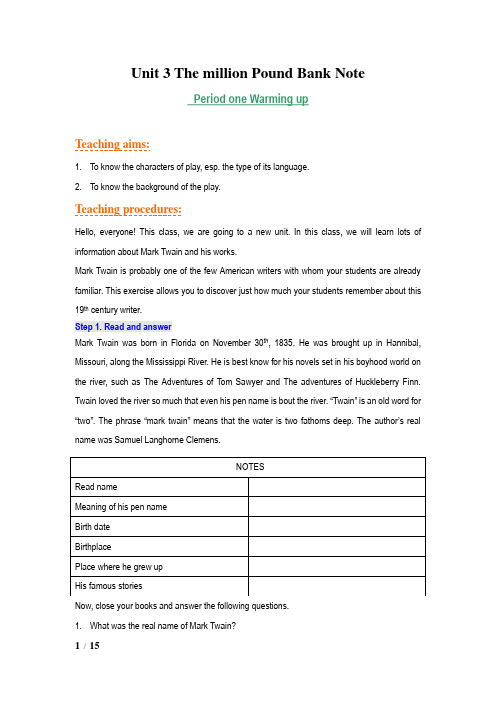
Unit 3 The million Pound Bank NotePeriod one Warming upTeaching aims:1.To know the characters of play, esp. the type of its language.2.To know the background of the play.Teaching procedures:Hello, everyone! This class, we are going to a new unit. In this class, we will learn lots of information about Mark Twain and his works.Mark Twain is probably one of the few American writers with whom your students are already familiar. This exercise allows you to discover just how much your students remember about this 19th century writer.Step 1. Read and answerMark Twain was born in Florida on November 30th, 1835. He was brought up in Hannibal, Missouri, along the Mississippi River. He is best know for his novels set in his boyhood world on the river, such as The Adventures of Tom Sawyer and The adventures of Huckleberry Finn. Twain loved the river so much that even his pen name is bout the river. “Twain” is an old word for “two”. The phrase “mark twain” means that the water is two fathoms deep. The author’s real name was Samuel Langhorne Clemens.Now, close your books and answer the following questions.1.What was the real name of Mark Twain?2.What century was he born?3.What was his job?4.Along which river are some of his most famous novels set?5.What does Mark Twain mean?6.Can you name one of his famous novels?7.Did he write plays as well as novels and short stories?8.Can you name one of his short sotries?Step 2. SharingAsk Ss if they know any of Mark Twain’s novels. If they know, let them tell the others the plot briefly. If not, tell them briefly.Summary of the adventures of Tom SawyerThis is a story about a young boy named Tom Sawyer who is very mischievous and likes o go on adventures. He lives with his Aunt Polly and his halfbrother Sid. Tom also had two friends named Joe Harper and Huckleberry Finn. Bechy Thatcher is Tom’s girlfriend and Injun Joe is the town’s thief and murderer. This story takes place in the mid-1800s in a small village in Missouri along the Mississippi River.Summary of the adventures of Huckleberry FinnBefore the novel begins, Huck Finn has led a life of absolute freedom. His parents are either dead or absent and so Huck is not used to following any rules. The most important part of his character is his desire to save a black slave, Jim, and free him from slavery. He runs away with Jim whom he sees as a person and not property. They escape down the river giving Huckleberry time to think of the best thing to do.Step 3. Homework: Try to read one of Mark Twain’s work and share it with your partner.Period two ReadingTeaching procedures:Step 1. Pre-readingDiscuss the question with your partners and then report your work. Encourage to express your opinions freely.(1) If a rich person gives you a large amount of money to use as you like, for example, one million pound, what will you do with it? Why?(Have a discussion on this question. Whatever choice students make here, they should be ready to offer their classmates a good reason for it.)(2) Have you ever made a bet with your friend? If so, what did you bet on? How did you feel about the bet after it was won or lost?(3) Have you ever read the story “The Million Pound Bank-N ote”? Have you seen the movie? If so, what did you think of it? Do you want to know what happened to Henry Adams in THE MILLION POUND BANK-NOTE written by Mark Twain? Have you ever read the story? So this class we will learn the story together.Step 2. Readingnguage pointsDiscuss some important sentences and phrases in the passage.1. bet n.(1) agreement to risk money, etc on an event of which the result is doubtful 赌博make a bet 打赌Let’s make a bet on the next election 咱们赌下次大选好吗?have a bet 打赌win/lose a bet 打赌赢/输了accept/take up a bet(2) The money, etc risked in this way (金钱等)赌注v. ①risk (money) on a race or some other event of which the result is doubtful 打赌,赌博Mrs. Black spent all her money betting on horses.布莱克夫人把她所有的钱都花在了赌马上。
人教新课标必修3Unit3TheMillionPoundBankNoteGrammar教案

人教新课标必修3Unit3TheMillionPoundBankNoteGrammar教案一、教学目标1.让学生掌握情态动词的用法,尤其是can,could,may,might的辨析。
2.培养学生运用情态动词描述能力、可能性、允许等情景的能力。
3.提高学生的语法运用能力,增强语法学习的兴趣。
二、教学重难点重点:1.情态动词can,could,may,might的用法和辨析。
2.情态动词在句子中的运用。
难点:1.情态动词的各种用法和区别。
2.情态动词在实际语境中的灵活运用。
三、教学过程1.导入利用图片或视频引导学生谈论关于能力、可能性、允许等话题,激发学生的兴趣。
2.课堂讲解介绍情态动词can,could,may,might的用法和区别,通过例子让学生更好地理解。
can表示能力,可能性,允许,用于肯定句和否定句。
could表示能力,可能性,允许,用于肯定句和否定句,语气比can更委婉。
may表示可能性,允许,用于肯定句和否定句。
might表示可能性,用于肯定句和否定句,语气比may更委婉。
3.练习设计一些练习题,让学生在实际语境中运用情态动词。
例如:根据句子意思,选择正确的情态动词填空。
1.He___________(can/could/may/might)speakEnglishwell.2.You___________(can/could/may/might)notentertheroomwith outpermission.3.There___________(can/could/may/might)beapartytonight.让学生分组讨论,互相检查答案,然后全班一起核对答案。
4.课堂活动设计一个小游戏,让学生在游戏中巩固情态动词的用法。
例如:猜词游戏。
教师提前准备一些关于情态动词的句子,学生轮流猜句子中的情态动词。
5.语法练习让学生完成一些语法练习题,以巩固情态动词的用法。
例如:改写句子,使用正确的情态动词。
2019-2020学年人教新课标版高中英语必修三:Unit 3 The Million Pound
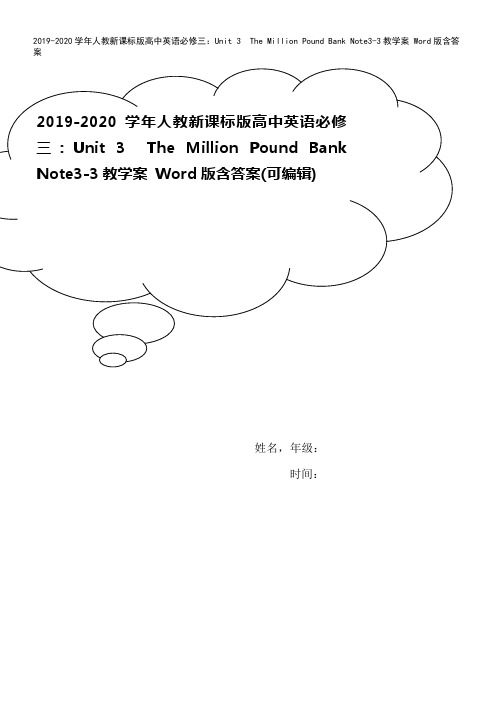
姓名,年级:时间:Part ⅢGrammar &WritingGrammar——名词性从句(Ⅰ):宾语从句和表语从句一、概念在复合句中起名词作用的句子叫名词性从句。
名词性从句可分为主语从句、宾语从句、表语从句和同位语从句。
二、基本用法(一)宾语从句1.定义:在主从复合句中充当宾语的从句,叫作宾语从句。
它可以充当句中谓语动词、介词或形容词的宾语,有时也作非谓语动词的宾语。
2.连接词的用法(1)that引导的宾语从句I am afraid (that) I've made a mistake.恐怕我已经犯了一个错误。
He said (that) you were too young to understand the matter and that you were asked not to care about it。
他说你太年轻,还无法理解这件事情,你也不要去管它。
(2)whether或if引导的宾语从句whether或if引导宾语从句时,在句中不充当成分,但是含“是否”之意,从句要用陈述语序。
I don’t know if/whether he still lives here after so many years.我不知道这么多年以后他是否还住在这儿.[关键点拨]只用whether不用if引导的宾语从句在宾语从句中,引导词whether和if基本一样,但下面两种情况只能使用whether:(1)引导介词后的宾语从句时.(2)和or not一起连用时。
It depends on whether it will be fine.那得看是不是晴天。
I don't know whether or not he will come.我不知道他是否会来。
(3)连接代词和连接副词引导的宾语从句The policeman asked me how the accident had happened.警察问我事故是怎么发生的。
高一英语教案:必修三Unit3教案

A Teaching PlanUnit 3 The Million Pound Bank-NoteWarming up and ReadingTeaching aims and demands:*Knowledge aims:1. To learn some words and expressions.2. To make sure the students have a full understanding of the text.3. To guide the students to have a discussion about the characters in the text .4. To get the students to know more about a play by reading and acting.*Ability aims:1. To cultivate the students’ reading ability.2. To cultivate the students’ oral English skills and related knowledg e about a play by discussion and acting.*Moral aims:1. To enable the students to know more about the quality of capitalist society and to educate them to love our country more.2. To educate the students to work together to finish some tasks.3. To arous e the students’ interest in learning English through various activities in class.Teaching important points:1. To make the students have a full understanding of the text.2. To make the students know more about a play by discussion and acting. Teaching difficult points:1. To improve the students’ reading ability.2. To enable the students to voice their opinions freely.Teaching materials:1. The videos of the film clips.2. Some related pictures.3. A tape of the text.Teaching aids:1. Multi-media facilities.2. A recorder.Teaching methods:1. Asking-and-answering method.2. Discussing method.The title : Unit 3 The Million Pound Bank-NoteSome words and phrases: a large amount of ; millionaire ; make a bet (on sth.) ; land (v.); bay ; jealous ; character ; “fact” and “opinion”附: 马克• 吐温的格言警句1. The man who does not read books has no advantage over the man that cannot read them.2. Always tell the truth; then you don’t have to remember anything.3. When people do not respect us we are sharply offended; yet deep down in his private heart no man much respects himself.4. Good breeding consists in concealing how much we think of ourselves and how little we think of the other person.。
人教版高中英语必修三Unit3TheMillionPoundBankNoteWriting教案
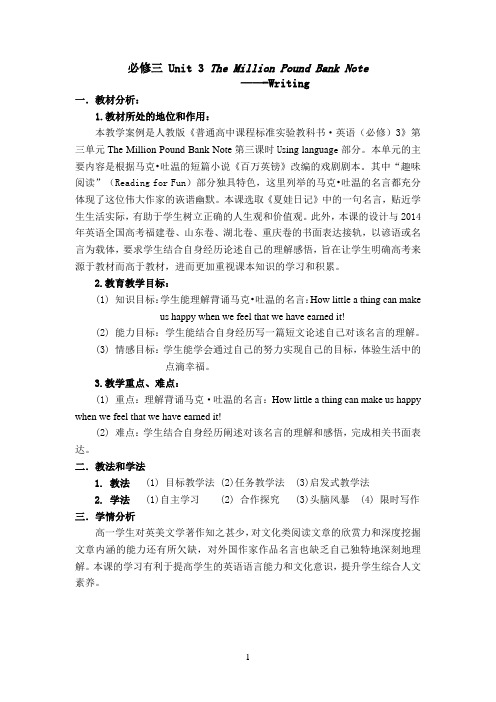
必修三 Unit 3 The Million Pound Bank Note——-Writing一.教材分析:1.教材所处的地位和作用:本教学案例是人教版《普通高中课程标准实验教科书·英语(必修)3》第三单元The Million Pound Bank Note第三课时U sing languag e部分。
本单元的主要内容是根据马克•吐温的短篇小说《百万英镑》改编的戏剧剧本。
其中“趣味阅读”(Reading for Fun)部分独具特色,这里列举的马克•吐温的名言都充分体现了这位伟大作家的诙谐幽默。
本课选取《夏娃日记》中的一句名言,贴近学生生活实际,有助于学生树立正确的人生观和价值观。
此外,本课的设计与2014年英语全国高考福建卷、山东卷、湖北卷、重庆卷的书面表达接轨,以谚语或名言为载体,要求学生结合自身经历论述自己的理解感悟,旨在让学生明确高考来源于教材而高于教材,进而更加重视课本知识的学习和积累。
2.教育教学目标:(1) 知识目标:学生能理解背诵马克•吐温的名言:How little a thing can makeus happy when we feel that we have earned it!(2) 能力目标:学生能结合自身经历写一篇短文论述自己对该名言的理解。
(3) 情感目标:学生能学会通过自己的努力实现自己的目标,体验生活中的点滴幸福。
3.教学重点、难点:(1) 重点:理解背诵马克·吐温的名言:How little a thing can make us happy when we feel that we have earned it!(2) 难点:学生结合自身经历阐述对该名言的理解和感悟,完成相关书面表达。
二.教法和学法1. 教法(1) 目标教学法 (2)任务教学法 (3)启发式教学法2. 学法(1)自主学习 (2) 合作探究 (3)头脑风暴 (4) 限时写作三.学情分析高一学生对英美文学著作知之甚少,对文化类阅读文章的欣赏力和深度挖掘文章内涵的能力还有所欠缺,对外国作家作品名言也缺乏自己独特地深刻地理解。
高一英语教案:必修3Unit3教案

Unit 3 The Million Pound Bank-NoteI.教学内容分析本单元的主要内容是根据马克·吐温的名著《百万英镑》改编而成的剧本中的几个片断以及马克·吐温的生平简介。
Warming Up通过对马克·吐温及其作品的讨论引发学生学习兴趣,使学生对马克·吐温及其作品有个初步的了解。
Pre-reading首先要求学生回答几个相关的问题,并让他们展开想象,借助讨论引入到《百万英镑》的情节。
Reading部分是详细介绍富商兄弟俩打赌把一张百万英镑的钞票给一个一无所有、诚实可靠的穷人,想看看会发生什么事。
最后他们物色到一个穷困潦倒、流落伦敦街头的美国小伙子Henry Adams。
本部分可以通过先熟读后改编的形式,让学生登台表演,培养学生的调控能力和交际能力,然后再利用多种形式的练习让学生深入理解课文。
Learning about Language部分突出了词汇和语法的学习与训练。
本单元的语法是名词性从句中的宾语从句和表语从句的具体用法。
Using Language部分中包括了听、读、写三个部分的内容,是本单元主要篇章的延伸。
学生通过感受百万英镑给亨利带来什么样的待遇而进一步理解作者诙谐讽刺的写作风格。
该部分比较连贯,提出的一些问题有利于培养学生独立思考的能力和文学素养。
其中写作部分是训练学生选取和组织材料的能力,通过前面的学习,结合独立的思考,写出形象鲜明且语言流畅的戏剧。
Learning Tip指导学生掌握对话的技巧,了解如何使用相应的语音和语调来编排戏剧,提高学生的写作水平。
II.教学重点和难点1. 教学重点(1) 本单元教学目的和要求中的生词和短语;(2) 掌握名词性从句中的宾语从句和表语从句的具体用法;(3)了解戏剧(剧本)语言的特点,如舞台说明(stage directions)用一般现在时态,台词中有很多的省略句等。
2. 教学难点(1)了解《百万英镑》及其作者马克·吐温的时代背景,提高学生的文学修养和培养学生的跨文化意识;(2) 学习语言交际中委婉请求、请求允许和点餐的表达法;(3) 学习怎样去写或编一个短剧和更难的比较长的戏剧。
2019-2020学年人教版高中英语必修3教案Unit3TheMillionPoundBankNoteperiod4教案2

课题B3 Unit 2 Writing班级:姓名:_______________小组:______________ 【学习目标】利用本单元所学重点短语写作。
【学习重点】利用本单元所学重点短语写作。
【学习难点】利用本单元所学重点短语写作。
教学方法个人自主学习、小组合作探究、教师精讲点拨【导学流程】定向导学2m’单词短语我最棒。
1.盯着__________2. 使某人想起_______________3.允许某人做某事_______________4.冒险___________5. 无意_______________6. 一幕____________7.介意某人做某事__________________ 8. 正相反_________9. 那就是----的原因________________________________【答案】1. stare at 2. remind sb. Of 3. permit sb. to do 4. take a chance 5. by chance 6. a scene 7. mind sb. doing sth. 8. on the contrary 9. That is why静心自学10m’句式结构我最行:1.使我回忆起那些日子_______________________________________________2.我被叔叔养大__________________________________________________3.不允许他很多时间玩电脑__________________________________________4.她冒险打开叔叔的电脑_____________________________________________5.这就是我喜欢美国文学(literature)的原因。
__________________________________ 【答案】1. remind me of those days 2. I was brought up by my uncle. 3. not permit him to spend a large amount of time playing the computer 4. He took a chance to turn on his uncle's computer5. That is why I like American literature.疑问记录单句翻译我最会:学法指导:先独立翻译下列句子,然后小组进行讨论,进行展示。
人教新课标高一英语下学期必修3教案设计 Unit3 The Million Pound Bank N

人教新课标必修3教案Unit3 The Million Pound Bank Note[Period 3&4] The Third Period ListeningI. Teaching goals 教学目标1. Target language 目标语言a. 重点词汇和短语:by mistake, go traveling, a sum of money, have a bet on sb., a born fool, get paidb. 重点句子:He begins to worry that he has got the banknote by mistake.He’ll think we never dealt with a rich man before.2. 能力目标a. Enable the students to have independent thought and speculate about human behavior in a given situation.b. Master the usage of “noun clauses as the object”3. 学能目标1. Get the students to have independent thought and speculate about human behavior in a given situation.2. Make the students master the usage of “noun clause as the object”.II. Teaching important points教学重点:1. Practice students’ listen ing2. Master the usage of “noun clauses as the object”III. Teaching difficult points教学难点Master the usage of “noun clauses as the object”IV. Teaching methods 教学方法Practicing independently & explainingV. Teaching aid 教具准备A multiple-media computer & a blackboardTeaching procedures and ways教学过程与方式Step I RevisionT: At the beginning of this class, let’s check the homework. Are you ready?SS: Yes.Then students check their homework each other.Step II Listening (P23)Read and guessT: Today we’re going to listen to a part of a play. Before listening, please open your books and turn to page 23.Let’s do Ex1 after listening to the tape. You are to complete the questions independently.After several minutesT: Who can guess what this part is about?SS: Henry worries that he has got the bank-note by mistake, so he goes back to visit the two brothers again. But they have gone traveling.Task 1 GuessingT: Please listen to the tape and tell me the main idea.Task 2 ListeningT: Now listen to the tape again and decide how to answer the questions.Play the tape again and then check the answers.Task 3 Reading and RetellingT: Now, class, let’s read the listening text so that you can have a better understanding of the listening. And then we will retell it.(Then the teacher gives the listening text with a computer and students read the listening text aloud. Then the teacher asks the students to retell the story.)Step III Listening in Workbook (P55-56)In this part, get the students first guess what the listening text is about, ask them to listen carefully and do the exercise. After that, allow them to have a discussion about the answer, and check the answers with the whole class. At last, teachers show the listening material on the slide.Task 1 GuessingT: Let’s go on practicing listening. Open your textbook to page 55-56. This activity is to develop the story that can train your ability of guessing the development of a story. First, read the questions and guess what the listening is about.After several minutesT: Can you guess what the listening is about?SS: I think the listening is about what happened to Henry at a tailor’s shop.T: Can you tell us more about it?SS: Yes. Henry wants to change his clothes because he was in rags. So he goes into a tailor’s shop. But the shop assistant who is called Todd is not polite to him and just shows him some cheap clothes in the beginning. When Henry takes out a million-pound bank-note, Todd as well as his boss begin to be kind to Henry.T: Good! Let’s listen to fin d out whether it is true.Task 2 ListeningT: Now listen to he tape. Make some notes of what you hear while listening. I’ll play the tape twice. Listen carefully. After that we will check the answers together.Task 3 Reading the listening textT: Now, class, let’s read the listening text so that you can have a better understanding of the listening.(Then the teacher gives the listening text with a computer and students read the listening text aloud.)T: Ok, class, you’ve done a good job. That’s all for the listening practice. Next, listen to the homework.Step IV Homework1. Consolidation:T: Boys and girls, today we have practiced listening of this unit and learned some words and phrases. Although I think it’s not difficult for you to master them, aft er class you should review them.2. Preview the fourth period.The Fourth Period SpeakingI. Teaching goals 教学目标1. Target language 目标语言a. 重点词汇和短语: have…on/with/about sb, judge sb by sth, put sb to the trouble of doing sth, at the brothers’home, at the tailor’s shop, earn a living, give sb. A wink of the eye, walk over to sb. learn…by heart, speak with passionb. 重点句子He knew that he might need the ambassador when others found out just how poor he really was.The two brothers are seated, waiting.Then she sits in Oliver’s lap, puts her arms around his neck and kisses him on the cheek.2. 能力目标Enable the students to make their own dialogue and write a scene for Act Two.3. 学能目标Get the students to make their own dialogue and write a scene for an act.II. Teaching important/difficult points教学重/难点:Train the ability of writing a scene for an act and talk about it.III. Teaching methods 教学方法Help the students practice spoken English by talking publicly and a co-operative method for the play writing.IV. Teaching aid 教具准备A multiple-media computer & a blackboardTeaching procedures and ways教学过程与方式Step I RevisionStudents check their homework by themselves.Step II Talking (P55)T: Since we have read and listened to so many parts of the play, why not write a scene for an act? Now, open your textbook to page 55, and look at Talking.(Students read the request of this part: After reading the letter from the brothers, Henry puts it back into his coat pocket. Then he notices that his coat is worn out. So he finds a tailor’ shop and goes in to get a new coat.)T: Make a dialogue for Act Two, Scene 1 with a partner using all of the following information: Henry tells a clerk that he wants a coat for a suit. The clerk shows him a cheap coat downstairs. Henry doubts if he should take it. The clerk persuades him to buy it. Henry agrees, but explains that he can’t pay him right now, as he has no small change. In your dialogue, include expressions on shopping. Practice your dialogue and then share it with another p air. And we’ll see which has the most appropriate for the play.1. Suggested scene:The dialogue takes place at a tailor's shop. (O=Owner; C=Clerk; H=Henry)O: There's a customer, Todd. Will you serve him?C: I don't know why he's in a tailor's shop. Just look at his clothes!O:No matter what he's wearing, Todd, just show him the cheapest.C: Do you want anything?H:Yes, please. I want to buy a suit.C: Of course. You may find these rather expensive. We've got some cheaper ones in the back room. Will you come through to the back, please?...Why don't you try this one on?H:Mmm, it doesn't seem to fit very well.C: I'm afraid it's the cheapest one we've got.H:Very well, I'll take it. Could you wait a few days for the money? I don't have any small notes on me.C: Oh, you haven't? Well, of course, I know that gentlemen like you carry only large notes.H:My friend, you shouldn't judge strangers always by the clothes they wear. I'm quite able to pay for this suit. I just didn't wish to put you to the trouble of changing a large note.C: Why do you think we can't change your note? Of course we can.H:Oh, very well. Then there is nothing to worry about. I apologize. (Hands him the note.)2. Explanations to the suggested scene:T: Maybe you find something is difficult to understand. So let me explain some to you.(1) have…on/with/about somebody means take or bring something when someone goes to a place.(2) put somebody to the trouble of doing something means make someone have the trouble of doing something.(3) Change means the money that you gave back when somebody has paid you too much. e.g. Give me my change.(4) judge somebody / something by / from something: form an opinion about somebody.e.g. Judging from what you say, they ought to succeed.e.g. Don’t ju dge a man by his looks.Step III Listening, Speaking and writing Task (P58)T: Imagine that Henry meets the woman of his dreams-Portia, how will they talk with each other? How would Portia know if Henry was telling her the truth? How would Henry say that he likes her very much in a way that she would like? Now, listen carefully to Act Two, Scene 3 and make a few notes to use when you write your dialogue.1. Students listen to the tape, make notes and then share their notes with another pair. T: Well, boys and girls, all of did a good job. But in order to help you to write a better dialogue, we should read the listening text together. Look at the big screen.Then the teacher show the listening material and the students read it aloud.(The following is the listening text of this part.)N=Narrator A=Ambassador P=Portia H=HenryAct Two, Scene 3N: Well, very soon, it seemed as if everyone in London was talking about Henry. After a while, he felt it was his duty to report to the American ambassador to Britain. The Ambassador gave him a warm welcome and invited Henry to a dinner party that very night. Of course, Henry was glad to go. He knew that he might need the ambassador when others found out just how poor he really was. Now Henry is on the balcony of the Amer ican ambassador’s home in London.A: Ah, there you are.P: (to Henry) How do you do?A: Mr. Adams, my special guest, Miss Portia Langham.H: How do you do?P: I’m afraid you must be too busy for me.H: Yes, indeed, I am. I mean, no, no, not at all!A: If y ou’ll excuse me, I must return o the other guests.P: Won’t you sit down, please?H: Yes, I’d love to-err-I’d like to. Thank you, Miss.P: That poor, dear ambassador. He hates these parties almost as much as I do. Nothing but talk, talk, talk. And no one says anything anyone wants to hear, do they?H: No, I suppose not.P: The ambassador tells me you are a rich man.H: Well-err-not really.P: He tells me you are the talk of London these days. Why, it seems that every banker and shop owner in the city wants to meet you.H: Yes, I’ve head. I can’t understand why, really. I’m not so special as that.P: Oh, I don’t know about that, Mr. Adams.H: Please, call me Henry.P: Henry. I mean, even the ambassador is eager to know you better.H: Yes, it would seem to be so.P: What’s the matter?H: Oh, nothing. Nothing, at least, that anyone can help with.P: Are you in some kind of trouble, Henry?2. Students discuss each of the following things in pairs:(1) Which things Henry might tell Portia about himself?(2) Which things he might keep a secret himself?(3) Which things Portia might tell Henry about herself?(4) Which things she might keep a secret about herself?(5) What they might say about each other?3. Students finish writing the dialogue for Act Two, Scene 3, making the words sound believable.Suggested dialogue:Henry: In a way, yes. It is not of my own doing though. I was given a million pound banknote to use for 30 days. Now everybody thinks I am rich. But I really don’t have a penny.Portia: Is that all? I thought you were a bank robber or had hit your grandmother. Henry: How could you have such terrible thoughts?Portia: I do tend to think about the bad side of the people I meet.Henry: Why is that? I am sure people could only be kind and thoughtful to you. Portia: Well, you see….Henry: If I am going to let you see all my bad points, I had better do it now. I can not sail a boat well and I have no job.Portia: Well I can not sail a boat well either and have no job either.Henry: I knew we were meant for each other.Portia: What a lovely thought. Now my bad points. I have no money of my own and I c an not earn my own living at all. In fact I am useless.Henry: Not to me! You look the sweetest and most honest girl in the world to me!T: Well done! Your dialogues are different, but they are all good. Do you want to know which is fit for the next scene? Now, let’s read Act Two, Scene 4.Step IV Reading and Speaking Task (P59)1. Students read Act Two, Scene 4 by themselves.T: After reading this part, can you guess how the play will end? Now, in pairs, talk about the end and be sure to describe what you think Portia will say and do next. Then describe what you think Henry and the two brothers will say and do after that.2. Students discuss the end to the play:S1: I think the play has to end happily. But it will be difficult if Portia thinks Henry is rich and he is not.S2: Yes, I agree. There must be some way of letting Henry and Portia get married but have money too.S1: But how can that happen when Henry has to give back the banknote?S2: There is also the problem of him having brought a lot of things and not paid for them.S1: So I think one of the brothers must come to the rescue and help him.S2: Perhaps they can adopt him as their son so he gets a lot of money that way.S1: Perhaps the job they give him will pay very well.S2: Yes, I think that is the answer. He will have to be given a job with a very large salary.3. Students read the real end to the play.4. Students listen to the tape that is about Act Two, Scene 4 and the real end to the play so that they can correct their pronunciation and be ready for acting.Step V HomeworkT: Boys and girls, you did very well today. But suppose that Henry feels tricked by Portia when he finds out that Oliver is her stepfather. How might the play end differently under these circumstances? So, today’s homework: Write a different end to the play.。
高中英语人教版必修3教案-Unit_3_The_Million_Pound_Bank_Note_教学设计_教案_3
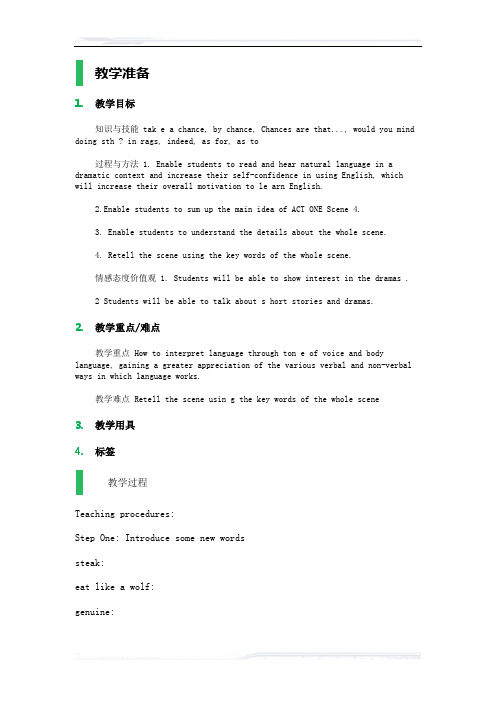
教学准备1. 教学目标知识与技能 tak e a chance, by chance, Chances are that..., would you mind doing sth ? in rags, indeed, as for, as to过程与方法 1. Enable students to read and hear natural language in a dramatic context and increase their self-confidence in using English, which will increase their overall motivation to le arn English.2.Enable students to sum up the main idea of ACT ONE Scene 4.3. Enable students to understand the details about the whole scene.4. Retell the scene using the key words of the whole scene.情感态度价值观 1. Students will be able to show interest in the dramas .2 Students will be able to talk about s hort stories and dramas.2. 教学重点/难点教学重点 How to interpret language through ton e of voice and body language, gaining a greater appreciation of the various verbal and non-verbal ways in which language works.教学难点 Retell the scene usin g the key words of the whole scene3. 教学用具4. 标签教学过程Teaching procedures:Step One: Introduce some new wordssteak:eat like a wolf:genuine:reserve:scream:fake:bow:Step Two: CULTURAL NOTE:Henry asks for a steak “extra thick” for his meal. In China, steak is generally cut thinly but in America it is appreciated if it is cut thickly and grilled or fried. The advantage of having a steak “extra thick” is that it can be well cooked on the outside but still raw or half raw in the center.Step Three: Read and answer these questions1. What was it in the letter?2. Before Henry took the note out of the envelope, did the waiter serve him politely? Why?3. Did the owner believe that the note was genuine or not? Why?4. Whose behavior changes the most during this scene?5. What kind of person is the owner of the restaurant?6. Why do you think the owner of the restaurant g ave Henry a free meal?Step Four: Detailedr reading1. What does “it’ll cost a large amount of money” exactl y mean?2. At the sight of the customer’s note, the owner and his waiter got very _ D_.A. frightenedB. angryC. worriedD. excited3. When did the hostess and the waiter change their attitude to the customer? _____D____A. At the beginning of the stor y.B. Before they saw the large note.C. At the end of the story.D. After they saw the large note.In group of four, play the parts of “Henry, waiter, owner and hostess”.Step Five:Retell the storyReflection:板书板书设计:1. What was it in the letter?2. Before Henry took the note out of the envelope, did the waiter serve him politely? Why?3. Did the owner believe that the note was genuine or not? Why?4. Whose behavior changes the most during this scene?5. What kind of person is the owner of the restaurant?6. Why do you think the owner of the restaurant gave Henry a free meal?。
_人教新课标必修3Unit3TheMillionPoundBankNoteGrammar教案
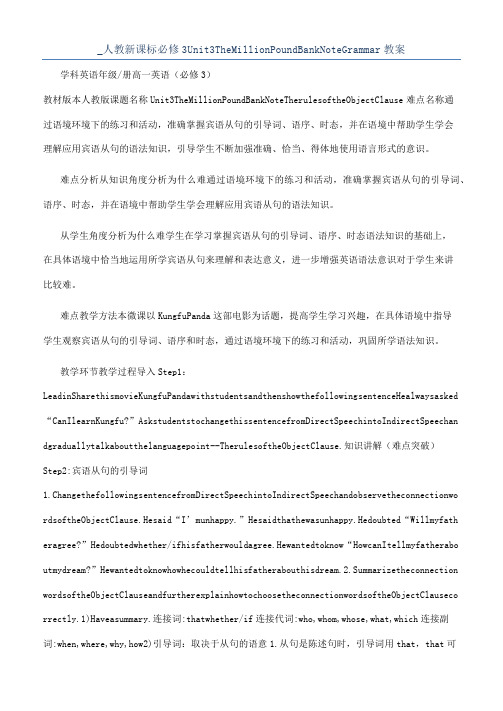
_人教新课标必修3Unit3TheMillionPoundBankNoteGrammar教案学科英语年级/册高一英语(必修3)教材版本人教版课题名称Unit3TheMillionPoundBankNoteTherulesoftheObjectClause难点名称通过语境环境下的练习和活动,准确掌握宾语从句的引导词、语序、时态,并在语境中帮助学生学会理解应用宾语从句的语法知识,引导学生不断加强准确、恰当、得体地使用语言形式的意识。
难点分析从知识角度分析为什么难通过语境环境下的练习和活动,准确掌握宾语从句的引导词、语序、时态,并在语境中帮助学生学会理解应用宾语从句的语法知识。
从学生角度分析为什么难学生在学习掌握宾语从句的引导词、语序、时态语法知识的基础上,在具体语境中恰当地运用所学宾语从句来理解和表达意义,进一步增强英语语法意识对于学生来讲比较难。
难点教学方法本微课以KungfuPanda这部电影为话题,提高学生学习兴趣,在具体语境中指导学生观察宾语从句的引导词、语序和时态,通过语境环境下的练习和活动,巩固所学语法知识。
教学环节教学过程导入Step1:LeadinSharethismovieKungfuPandawithstudentsandthenshowthefollowingsentenceHealwaysasked “CanIlearnKungfu?”AskstudentstochangethissentencefromDirectSpeechintoIndirectSpeechan dgraduallytalkaboutthelanguagepoint--TherulesoftheObjectClause.知识讲解(难点突破)Step2:宾语从句的引导词1.ChangethefollowingsentencefromDirectSpeechintoIndirectSpeechandobservetheconnectionwo rdsoftheObjectClause.Hesaid“I’munhappy.”Hesaidthathewasunhappy.Hedoubted“Willmyfath eragree?”Hedoubtedwhether/ifhisfatherwouldagree.Hewantedtoknow“HowcanI tellmyfatherabo utmydream?”Hewantedtoknowhowhecouldtellhisfatherabouthisdream.2.Summarizetheconnection wordsoftheObjectClauseandfurtherexplainhowtochoosetheconnectionwordsoftheObjectClauseco rrectly.1)Haveasummary.连接词:thatwhether/if连接代词:who,whom,whose,what,which连接副词:when,where,why,how2)引导词:取决于从句的语意1.从句是陈述句时,引导词用that,that可以省略.“KatewillgowithLily.”Hetellsme_________________________.2.从句是一般疑问句时,引导词用if或whether.“Isheateacher?”Iwanttoknow___________________________.3.从句是特殊疑问句时,引导词用特殊疑问词。
2019-2020学年人教版高中英语必修3教案Unit3TheMillionPoundBankNoteperiod2教案2
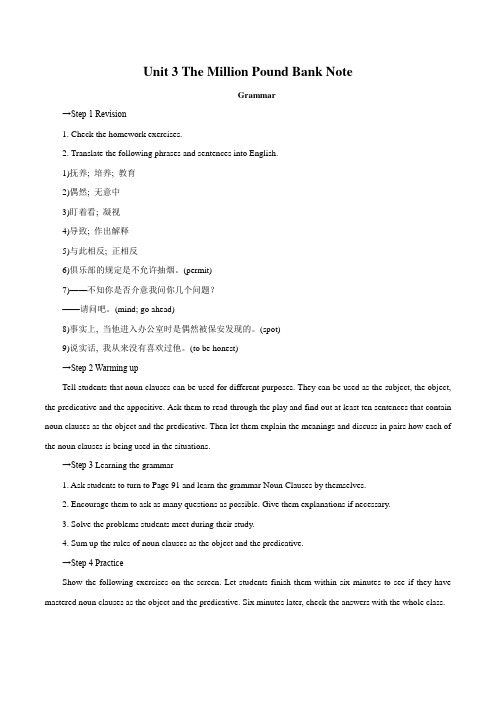
Unit 3 The Million Pound Bank NoteGrammar→Step 1 Revision1. Check the homework exercises.2. Translate the following phrases and sentences into English.1)抚养; 培养; 教育2)偶然; 无意中3)盯着看; 凝视4)导致; 作出解释5)与此相反; 正相反6)俱乐部的规定是不允许抽烟。
(permit)7)——不知你是否介意我问你几个问题?——请问吧。
(mind; go ahead)8)事实上, 当他进入办公室时是偶然被保安发现的。
(spot)9)说实话, 我从来没有喜欢过他。
(to be honest)→Step 2 Warming upTell students that noun clauses can be used for different purposes. They can be used as the subject, the object, the predicative and the appositive. Ask them to read through the play and find out at least ten sentences that contain noun clauses as the object and the predicative. Then let them explain the meanings and discuss in pairs how each of the noun clauses is being used in the situations.→Step 3 Learning the grammar1. Ask students to turn to Page 91 and learn the grammar Noun Clauses by themselves.2. Encourage them to ask as many questions as possible. Give them explanations if necessary.3. Solve the problems students meet during their study.4. Sum up the rules of noun clauses as the object and the predicative.→Step 4 PracticeShow the following exercises on the screen. Let students finish them within six minutes to see if they have mastered noun clauses as the object and the predicative. Six minutes later, check the answers with the whole class.Work in pairs. Take turns to ask each other the questions and answer them using noun clauses as the object. Think of more questions.1)Can you tell me if you like this play? → I must say that I really enjoy it.2)What do you think of the bet the brothers have made?3)What does Henry tell the brothers about his job in America?4)What else does Henry tell the brothers?5)What do the brothers want to know about Henry?6)What do you think will happen to Henry?→Step 5 Consolidation1. Ask students to do Exercise 5 in Discovering useful structures on Page 21.2. Let them do the exercises in Using structures on Page 57.→Step 6 Homework1. Finish off the Workbook exercises.2. Summarize the grammar item noun clauses as the object and the predicative in your exercise book.板书设计Unit 3 The Million Pound Bank NoteGrammar: noun clauses as the object and the predicative活动与探究As we know, noun clauses are often used in formal situations. Imagine you are looking for a job. Your partner is the interviewer. Make a dialogue to brainstorm some questions and answer them with noun clauses. Be ready to present your dialogue to the class.The following questions may help you:Why do you want to work for this company?Could you tell me why you are interested in this job?What quality do you think is the most important for this job?Could you tell me what you know about this company?You may begin like this:The interviewer: Why do you want to work for this company?You: The reason is that. . .。
- 1、下载文档前请自行甄别文档内容的完整性,平台不提供额外的编辑、内容补充、找答案等附加服务。
- 2、"仅部分预览"的文档,不可在线预览部分如存在完整性等问题,可反馈申请退款(可完整预览的文档不适用该条件!)。
- 3、如文档侵犯您的权益,请联系客服反馈,我们会尽快为您处理(人工客服工作时间:9:00-18:30)。
宾语从句和表语从句用法归纳
宾语从句和表语从句是名词性从句的重要组成部分,也是高考的重点。
今天我们先谈谈这两种从句。
一、宾语从句
I. 宾语从句的引导词
引导宾语从句的词有:连词that, if, whether;连接代词who, whom, whose, what, which;连接副词when, where, how, why等。
(1)连词that在宾语从句中不充当任何成分,也无任何意义,可以省略;其它带有疑问意义的连接词则不能省略。
如:
I know (that) he is a good teacher.
He doesn’t know who first discover-ed America.
(2)whether与if
①二者都有“是否”的意思,一般可以换用,但在介词之后,不定式之前,与or not连用时,只能用whether。
如:
It all depends on whether they will support us.
She stood in the doorway, unable to decide whether to go in.
②引导否定的宾语从句时只能用if。
如:
I wonder if he won’t hurt the feeling of his girlfriend.
③另外引导主语从句(放在句首)、表语从句、同位语从句时,也只能用whether,不能用if。
(3)what
在宾语从句中,引导词what具有两种含义:①保留疑问,即“什
么”的意义;②相当于“all / everything that”,常译成“……的(东西或事)”。
II. 宾语从句注意事项
(1)宾语从句无论用哪种连接词来引导,语序都必须用陈述语序,尽管有时有疑问意义。
如:
Do you know when the lesson will begin?
(2)要注意主、从句时态的一致和相应变化。
如:
①当主句是一般现在时或一般将来时的时候,从句可根据说话人的需要选择适当的时态。
如:
She asks me if I went to Dalian last year.
②当主句是过去时的时候,宾语从句要用相应的过去时态。
如:He said that he would fly to Egypt the next day.
③当从句是客观真理、习惯动作或状态时,不受主句时态的限制。
如:
The teacher told the children that the sun rises in the east and sets in the west.
(3)it作形式宾语
在“主语+ 谓语+ it + 宾补+ 宾语从句”结构中,it用作形式宾语,而将真正的宾语从句后置。
如:
I thought it strange that he failed to call me.
二、表语从句
表语从句是在复合句中作表语的名词性从句,放在系动词之后,一般
结构是“主语+连系动词+表语从句”。
可以接表语从句的连系动词有be, look, remain, seem等,引导词有that, whether, what, which, who, whom, whose, when, where, why, how, because等;引导表语从句的that不省略,that仅起连接作用,在从句中不充当任何成分,无任何意义。
如:
The impression he makes on me is that he is a reliable person.
学习表语从句需要注意:
(1) the reason后面的表语从句只能用that引导。
如:
The reason why the little actress has been such a success is that she is both clever and hard-working.
(2) 在表示命令order等,建议suggestion, advice等的名词后的表语从句中,谓语动词要用虚拟语气:should + 动词原形,should可省略。
如:
His suggestion is that we (should) hold another meeting to discuss the problem.
(3) whether可引导表语从句,表“是否”,它在从句中不充当成分,if不能引导表语从句。
如:
The question is whether we can rely on him.
(4) 连接代词what, which, who, whom, whose除起连接作用外,还在从句中作主语、宾语、表语和定语。
如:
That’s what he is worried about. (在从句作中宾语)
The problem is who can do the work. (在从句中作主语)
(5) 连词because引导表语从句,只用在That / This / It is because ... 结构中。
如:
That is because she often works hard.。
